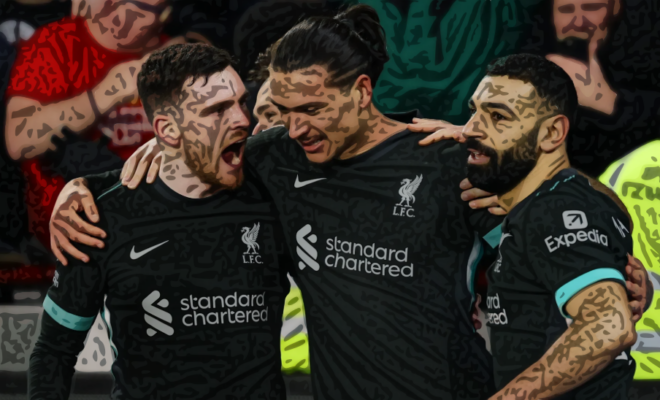Arsenal’s Need for a Killer Instinct: Learning from Liverpool’s Late Surge and Clinical Finishing

The Premier League title race is a marathon of resilience, tactical nuance, and, crucially, a ruthless ability to capitalize on fleeting opportunities. While Arsenal have showcased periods of dominance and growing tactical sophistication, a recent draw against Aston Villa at the Emirates, juxtaposed with Liverpool’s late show against Brentford, highlights a critical area for improvement: the ability to secure late goals and kill off games against stubborn defenses. This is not simply about luck; it’s about a combination of tactical flexibility, mental fortitude, and a clinical edge in the final third, something Liverpool demonstrated emphatically in their victory at the Gtech Community Stadium.
Liverpool’s Late Show: A Lesson in Ruthlessness
Liverpool’s 2-0 win over Brentford was a masterclass in patience and precision. Despite a frustrating first 90 minutes where chances went begging and the Brentford defense stood firm, they found a way. Two goals from Darwin Núñez in stoppage time, both products of clinical finishing and incisive attacking play, underscored the importance of maintaining focus and intensity until the final whistle. The first goal, a result of Trent Alexander-Arnold’s smart cutback pass, and the second from a fast break and assist from Harvey Elliott, demonstrated a team that was both tactically aware and mentally resilient, capable of turning a potentially frustrating draw into a vital three points.
Arsenal’s Near Misses: A Recurring Theme
Arsenal’s recent draw with Aston Villa at home provides a stark contrast. The Gunners, despite dominating for large periods, particularly in the first half, failed to convert their superiority into a decisive victory. They started the match strongly, taking a deserved lead through Gabriel Martinelli, and extended this lead after the breakthrough of Kai Havertz. This dominance, however, did not translate into a comfortable victory.
- Numerous chances were created but ultimately squandered.
- Leandro Trossard was denied by a save from Emiliano Martinez.
- Mikel Merino struck the post in the dying moments of the match.
- Havertz had a goal disallowed by VAR for handball.
- And late on, Trossard was denied from close range.
These instances highlight a recurring theme in Arsenal’s recent matches: the inability to translate ‘almost’ moments into actual goals. While their attacking play has been fluid and impressive at times, they lack the clinical edge to make the crucial difference.
Missed Opportunities and the Difference Between ‘Almost’ and ‘Actually’
Arsenal’s match against Villa was a showcase of what can happen when a team lacks a killer instinct. Despite taking a two-goal lead, the Gunners were pegged back by Villa, who demonstrated an ability to punish their hosts for failing to take their chances. Aston Villa’s comeback, which included goals from Youri Tielemans and Ollie Watkins, served as a reminder of how quickly a game can shift. The disallowed goal from Havertz after a VAR review, where the ball was judged to have struck his hand rather than his torso, further exemplified the difference between creating a scoring opportunity and converting it. This inability to capitalize on their chances has been a key factor in their failure to close the gap with Liverpool at the top of the league.
Liverpool, in contrast, exemplified the importance of clinical finishing. Despite a match where opportunities were scarce, they seized the decisive moments when they presented themselves. The two late goals by Nunez were not just about skill but also about a mentality that refuses to settle for less than a victory. This ability to turn tight matches into wins is what separates title contenders from the rest. Liverpool’s ability to grind out wins, even when not at their best, is a hallmark of a champion side. Their substitutions played a key part in this victory, further emphasizing the importance of tactical flexibility and decisive changes in the late stages of a match.
Late Game Substitutions: A Decisive Factor
Liverpool’s use of substitutes against Brentford was a critical element in their late surge. Arne Slot’s decision to introduce Darwin Núñez, Andy Robertson, and Harvey Elliott provided fresh legs and new dimensions to their attack, ultimately leading to the late goals. These tactical adjustments showed a willingness to adapt and find a way to break down the opposition’s defense. By contrast, while Arsenal did make late substitutions, they failed to change the course of the game in a positive way. The introduction of Raheem Sterling did not result in any late goals.
Breaking Down Stubborn Defenses: A Tactical Imperative
Both Brentford and Aston Villa deployed defensive setups that proved challenging for their respective opponents. Brentford’s resilience, despite their recent struggles, highlights the difficulties of breaking down deep-lying defenses, a tactical challenge that Arsenal will frequently encounter as teams look to nullify their potent attack. Similarly, Aston Villa’s game plan was designed to frustrate Arsenal, allowing them possession but seeking to strike on the counterattack.
- The game plan from Unai Emery allowed Arsenal possession but sought to counter on the break.
- Watkins caused issues for the Arsenal defense throughout.
- Digne, a half-time substitute for Villa provided an assist for Tielemans.
Arsenal, while adept at creating opportunities, need to find a way to be more versatile in their attack, particularly against these well-organized defenses. Relying solely on dominant first-half displays is not a sustainable approach. They need to develop the tactical flexibility and finishing ability required to break down deep-lying defenses and turn frustrating draws into crucial victories. This requires not just patience but also the kind of creative and clinical spark that Liverpool showed. The ability to adapt their tactics and find new avenues to goalscoring is key to becoming a more versatile and successful team.
Tactical Flexibility: A Must-Have for Title Contenders
Arsenal’s attacking prowess is clear, but they must also develop the capacity to adjust their approach and find different ways to score goals. Against well-organized defenses, relying solely on their standard attacking patterns may not be sufficient. The ability to make decisive substitutions, vary the point of attack, and adapt to the game’s flow is what separates the best teams from the rest. The team must improve their tactical flexibility in order to break down deep-lying defenses, something Liverpool demonstrated by making decisive substitutions, which injected fresh dynamism and ultimately lead to the victory.
While Arsenal have showcased many positive signs, such as their possession-based dominance and the creation of numerous chances, the inability to turn dominance into goals and to secure late wins is a weakness. The draw against Aston Villa contrasted with Liverpool’s late surge against Brentford, highlights the need to develop a more ruthless edge in the final third. Arsenal need to improve their finishing, become more tactically versatile, and display the mental fortitude required to secure victories against stubborn defenses. This is not just about luck; it’s about cultivating a killer instinct, something Liverpool has demonstrated masterfully. The Premier League title race is a battle of inches, and it’s the teams that can consistently turn near-misses into actual goals that will ultimately lift the trophy.


